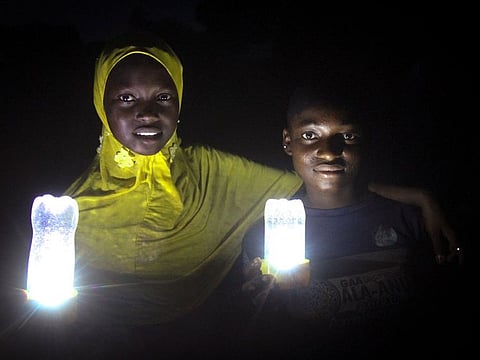Nigeria’s LightEd Impact Foundation wins Dh500,000 Sharjah International Award for Refugee Advocacy
Non-profit group makes portable solar lamps and electric charging stations, cuts pollution

Sharjah: The Big Heart Foundation (TBHF) on Tuesday announced that the Nigerian non-profit LightEd Impact Foundation has been awarded the Sharjah International Award for Refugee Advocacy and Support (SIARA 2024).
By converting plastic waste and other recyclable materials into clean, affordable energy, LightEd has provided more than 50,000 underserved households with solar-powered solutions, reducing the use of harmful kerosene by 70 per cent, and positively impacting the environment by cutting down carbon emissions.
Established in 2022, LightEd, co-founded by Stanley Anigbogu and Stanley Omeh, has swiftly gained recognition for its innovative approach to tackling energy poverty in refugee camps and underserved regions across Africa.
The foundation provides sustainable energy solutions to refugee communities. Anigbogu tackled this issue through the circular economy model, repurposing electronic and plastic waste to manufacture portable solar lamps and electric charging stations.
Wider benefits
Selected from over 527 candidates from 53 countries, LightEd’s receipt of the Dh500,000 SIARA award underscores the potential for clean energy to be a catalyst for broader societal change, from education and healthcare to economic development and environmental sustainability.
TBHF Director Mariam Al Hammadi said: “Innovative solutions like those from LightEd Impact Foundation prove that change can stem from addressing even the most basic human needs. And through [SIARA], we continue to celebrate and recognise pioneering efforts that bring about transformative change in the lives of refugees and displaced individuals.”
Through initiatives like the LightEd Kids project, the foundation has established innovation labs and provided hands-on training, empowering 25,000 students to convert waste materials into practical solutions for global challenges. The project has also trained over 2,000 young community members in solar technology installation and maintenance.
In underserved and remote communities, particularly refugee camps across Nigeria like Makurdi, the LightEd Peace project has provided their products made of recycled e-waste and plastic waste, including solar-powered lamps and three solar-powered charging stations. These efforts have enabled greater productivity, improved safety, and enhanced access to essential services. Their contributions helped reduce crime rates and assaulting women at night.
Light for doctors and students
Beyond creating and providing 100 per cent solar-powered charging devices and sources of clean electricity - the LightEd Plus and LightEd Pico - the foundation also focuses on capacity building by training community members in the installation and maintenance of solar technology. The foundation has also made significant strides in enhancing education by providing solar lamps to students, enabling them to study after dark, which has led to improved academic performance and increased attendance in schools.
Additionally, the foundation has made contributions to healthcare in rural areas by powering clinics with solar energy, ensuring that vital services, including refrigeration for vaccines and medical supplies, are available even in the most remote locations. These efforts are critical in areas where healthcare delivery has been hampered by the lack of electricity, and they have directly contributed to improved health outcomes.
Sign up for the Daily Briefing
Get the latest news and updates straight to your inbox



